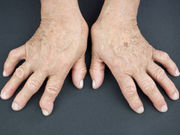Findings based on patients with previous inadequate response to biologics
THURSDAY, March 31, 2016 (HealthDay News) — Baricitinib, an oral Janus kinase 1 and 2 inhibitor, is superior to placebo in refractory rheumatoid arthritis, according to a study published in the March 31 issue of the New England Journal of Medicine.
Mark C. Genovese, M.D., from Stanford University in Palo Alto, Calif., and colleagues conducted a phase 3 study in which 527 patients were randomized (1:1:1) to baricitinib at a dose of 2 or 4 mg daily or placebo for 24 weeks. Patients previously had inadequate response to or unacceptable side effects associated with one or more tumor necrosis factor inhibitors, other biologic disease-modifying antirheumatic drugs (DMARDS), or both.
The researchers found that significantly more patients receiving baricitinib (4 mg) had an American College of Rheumatology 20 percent (ACR20) response at week 12 versus the placebo group (P < 0.001). The higher-dose baricitinib group also saw a significant improvement on the Health Assessment Questionnaire-Disability Index and the 28-joint Disease Activity Score based on C-reactive protein level, compared to the placebo group. However, there was no significant difference in the score of 3.3 or less on the Simplified Disease Activity Index. Baricitinib patients (at either dose) had higher rates of adverse events through 24 weeks versus patients receiving placebo.
“In patients with rheumatoid arthritis and an inadequate response to biologic DMARDs, baricitinib at a daily dose of 4 mg was associated with clinical improvement at 12 weeks,” the authors write.
Eli Lilly and Incyte, the manufacturers of baricitinib, funded the study.
Full Text (subscription or payment may be required)
Copyright © 2016 HealthDay. All rights reserved.








